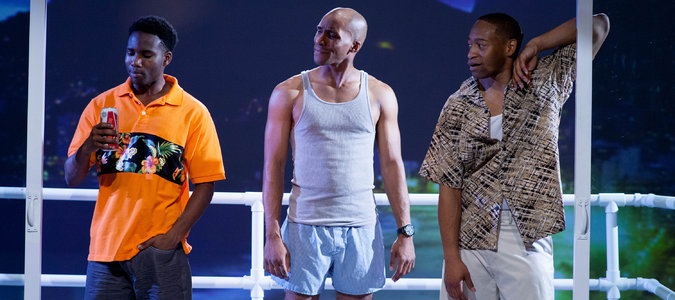

Carnaval
Opening Night: October 25, 2014
Closing: November 16, 2014
Theater: National Black Theatre
A year ago in Brooklyn, two young men mourned the untimely loss of their best friend. In his honor they decided then and there that, despite their differences, no matter where life took them, they would take care of his younger brother, and get together on the anniversary of his death to celebrate the life he should have had. So, on a cold day in the winter of 1996, these three twenty-something’s board a plane for Rio De Janeiro for a taste of the good life: sun, fun, and, of course, women – what better way to pay homage to a fallen friend? But what starts out as a joyride takes an unexpected turn and the three sex tourists find themselves in a situation that will change their friendships and their lives forever.
BUY TICKETSREAD THE REVIEWS:
November 9, 2014
Tourists of the world: Stay home. Few are the books, movies or plays in which vacations end well. Embarking on another cautionary holiday, Nikkole Salter’s Carnaval at the National Black Theater sends three men to Rio de Janeiro. If it weren’t for the flash-forward opening scene, you’d doubt they ever made it home. Comic and tragic by turns, the play is a brash, profane and somewhat contemptuous exploration of black masculinity and friendship. On the anniversary of a friend’s death, the smoothie Raheem (Gabriel Lawrence) invites the uptight Demetrius (Bjorn DuPaty) and the puppyish Jalani (W. Tre’ Davis) for a week of rum, sun and ladies of easy virtue. (Very easy. The men seem to meet only prostitutes.) Before the sex tourism begins, the veteran traveler Raheem counsels, “You all exotic ’cause you American,” but if you mess up, “see how quick you just black again.” Sure enough, the men find themselves in the kind of trouble that even a round of caipirinhas can’t fix. Ms. Salter, best known as one of the writers and stars of the Obie-winning two-hander In the Continuum, has a shrewd sense of the kinds of roles that actors will enjoy. Each man gets meaty speeches, comic sequences and sundry opportunities to hit emotional high notes, maybe a few too many. If she sometimes takes shortcuts in plotting and relies on stereotype, she creates lively situations and conversations. The actors, under the direction of Awoye Timpo, clearly think so. They even seem to enjoy the “yo mama” jokes, which are admittedly pretty good.
READ THE REVIEW


















